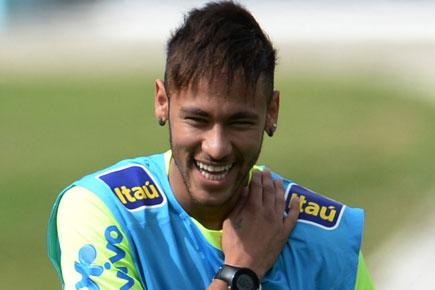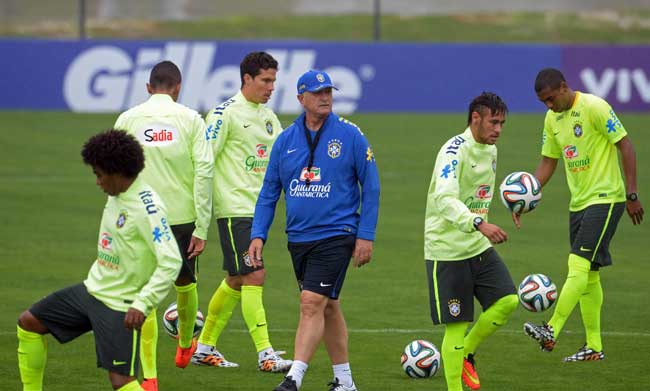Wall Street giant Goldman Sachs and Italian bank Unicredit both released studies that predict a Brazil vs Argentina final with the hosts winning at the Maracana stadium

Paris: Markets are bullish on Brazil, physicists say their victory in the World Cup is a near certainty, bookmakers are now giving only the shortest odds.
ADVERTISEMENT
Whatever way you look at it, the world's biggest sporting prize to be awarded in Rio de Janeiro on July 13 is for the host country to throw away.
Wall Street giant Goldman Sachs and Italian bank Unicredit both released studies Wednesday using "stochastic" or "footballistic" models or a "Monte Carlo simulation".
The rival institutions agreed that it will be Brazil v Argentina in the final and that maybe it will not be worth the Argentines turning up in the Maracana stadium.
 Coach Luiz Felipe Scolari (C) oversees a training session of the Brazilian national football team at the squad's Granja Comary training complex, in Teresopolis, 90 km from downtown Rio de Janeiro, ahead of the FIFA World Cup Brazil 2014 tournament. Pic/AFP
Coach Luiz Felipe Scolari (C) oversees a training session of the Brazilian national football team at the squad's Granja Comary training complex, in Teresopolis, 90 km from downtown Rio de Janeiro, ahead of the FIFA World Cup Brazil 2014 tournament. Pic/AFP
"The most striking aspect of our model is how heavily it favours Brazil to win the World Cup," said Goldman's report.
The American bank's study relied on six parameters including the Elo ranking of individual country's football success, goals scored and conceded in recent matches, past World Cup results and the advantage of the tournament venue.
Goldman said Germany and Spain would be the losing semi-finalists.
- Bearish on Europe -
Unicredit predicted South American domination with Uruguay also reaching the semi-finals and only Germany from Europe.
The Italian bank's assessment used FIFA's world ranking, home country and continent advantage, number of years as a FIFA member, the number of appearances in semi-finals of the under 17 and under 20 world championships and results from the last World Cup.
"The data say it all," proclaimed the bank, which highlighted Brazil's heat and humidity, better record and home advantage.
Host nations have reached the semi-finals in 12 of the past 19 World Cups. They have won six.
Brazil, however, has already been beaten at home -- in 1950 -- as it hates to be reminded.
World famed Cambridge University physicist Stephen Hawking is also backing 'la Selecao', even though he is not a football fan.
Hawking, who is nearly paralysed by motor neurone disease, put his money on Brazil in a commentary hammering his native England's chances.
"You would be a fool to overlook Brazil," said the author of "A Brief History of Time" who is more used to looking into the origin of the universe than forward to football matches.
Hawking is advising England to wear red as "Psychologists in Germany found red makes teams feel more confident and can lead them to being perceived as more aggressive and dominant."
He also calculated a formula for the perfect penalty -- shoot for the top corners.
The economists and scientists mirror bookmakers' predictions for the World Cup, which starts on June 12. Ladbrokes on Wednesday offered 3-1 for a Brazil triumph, Argentina 4-1 and Germany 5-1.
Many football haters are wondering however why there is so much interest in the World Cup with more than two weeks to wait until the start.
"Ever since the dawn of civilisation, people have not been content to see events as unconnected and inexplicable," Hawking said.
"They have craved an understanding of the underlying order in the world. The World Cup is no different."
So now the experts have decided, is it worth watching the World Cup?
"Irrational exuberance is everywhere," commented one London share trader, who likened predicting the World Cup to guessing which internet companies would survive the dotcom crash of 2000.
"People were so certain but results were so unpredictable. Companies were worth billions one day and nothing the next," said the trader, a Brazil fan who declined to be named.
 Subscribe today by clicking the link and stay updated with the latest news!" Click here!
Subscribe today by clicking the link and stay updated with the latest news!" Click here!






